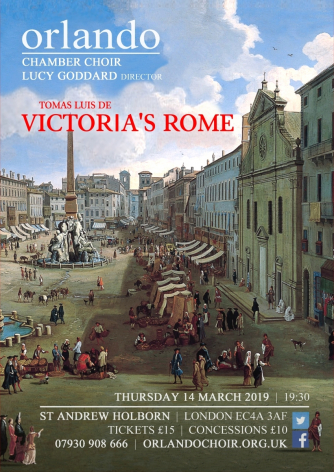Details
St Andrew Holborn
5 St Andrew Street
City of London
London
EC4A 3AB
England
Programme
Giovanni Pierluigi da Palestrina – Jubilate deo
Jacques Arcadelt – Non v'accorgete, amanti
Jacques Arcadelt – Se'l tuo partir mi spiacque
Orlando di Lasso – Occhi, piangete
Orlando di Lasso – Vivo sol di speranza
Tomas Luis de Victoria – Vidi speciosam
Tomas Luis de Victoria – O vos omnes, qui transitis per viam
Tomas Luis de Victoria – O quam gloriosum est regnum
~ Interval ~
Tomas Luis de Victoria – Laetatus sum a 12 (motet)
Luca Marenzio – Che fa oggi il mio sole
Luca Marenzio – Cruda Amarilli che co ’l nom’ancora
Luca Marenzio – Ombrose e care selve
Luca Marenzio – Leggiadre Ninfe
Philippe de Monte – Super flumina Babylonis
Giovanni Pierluigi da Palestrina – Angelus Domini descendit
Giovanni Francesco Anerio – Missa Pro defunctis: Introit
Performers
Lucy Goddard – Director
Orlando Chamber Choir
Programme Note
On an early spring day nearly 450 years ago, a young Spanish composer wandered through Rome where he had become cantor and organist at the church of Santa Maria di Monserrato. Tomás Luis de Victoria spent 22 years in the Italian city, from 1565 to 1587, and they were productivissimo. He held a number of prestigious posts, followed in Palestrina's footsteps as Maestro di Cappella at the Pontifical Roman Seminary, and took keen inspiration from the contemporary musical styles. In return, his compositions influenced the thriving international community of composers in Rome.
Orlando Chamber Choir’s programme begins with Giovanni da Palestrina’s rousing motet Jubilate Deo which highlights the Renaissance master’s influence on the younger De Victoria, whom he may have taught. We travel back in time to the Italian sojourns of Franco-Flemish composers Orlando di Lasso and Jacques Arcadelt. While in Rome they made their first forays into the madrigal form which, a few decades later, Luca Marenzio brought to its zenith with his chromatic style and exquisite word-painting – much to De Victoria’s admiration.
At the centre of the programme are four motets by De Victoria, including his superbly-crafted twelve-part Laetatus sum and the sublime Vidi speciosam for six voice parts.
Elements of Philippe de Monte’s motet Super flumina Babylonis suggest that, during his Roman years, he too was inspired by De Victoria’s writing. Our journey ends with a late work by Palestrina in which a wing-flapping angel descends from heaven, and with the Introit of the profoundly moving Requiem Mass by Roman-born composer Giovanni Anerio.
On his wander through Renaissance Rome, little did De Victoria know what influence his music would have, and how it would blend with his colleagues’ works into such a rich and varied programme.

 Your events at Classical Events
Your events at Classical Events

